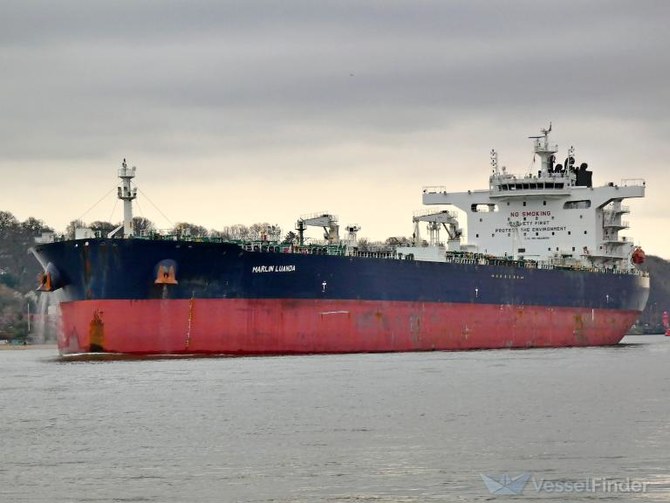
- ARAB NEWS
- 12 Jul 2025

SAANA: Yemen’s Houthis claimed Friday a missile strike on a British oil tanker in the Gulf of Aden that set the vessel on fire, the latest attack on international shipping by the Iran-backed militia.
It came the same day the US military said one of its warships shot down a missile fired at it by the group, which is acting in support of Palestinians in Gaza amid the Israel-Hamas war.
US and British forces have launched two rounds of joint strikes aimed at reducing the Houthis’ ability to target vessels transiting the key Red Sea maritime trade route.
Washington has also carried out a series of unilateral air raids, but the Houthis have vowed to continue their attacks.
The British military’s United Kingdom Maritime Operations, which oversees Middle East waterways, acknowledged a vessel had been struck by a missile and was on fire in the Gulf of Aden.
The British oil tanker, the Marlin Luanda, was hit by missiles fired by Yemeni naval forces, said the group’s military spokesman Yahya Saree. “The strike was direct, and resulted (in) the burning of the vessel,” he added.
Risk monitor Ambrey said a missile strike southeast of the Yemeni port of Aden set a merchant ship on fire.
“At the time of writing, the crew were reported safe,” it added.
Trafigura said that the fuel tanker Marlin Luanda, which was operating on its behalf, was struck by a missile as it transited the Red Sea.
Firefighting equipment on board is being deployed to suppress and control the fire caused in one cargo tank on the starboard side, the company said in an emailed statement.
“We remain in contact with the vessel and are monitoring the situation carefully,” it said, adding that military ships in the region were underway to provide assistance.
In the incident involving the US Navy vessel, the Houthis fired an anti-ship ballistic missile from Yemen toward the destroyer USS Carney in the Gulf of Aden, said US Central Command.
“The missile was successfully shot down by USS Carney. There were no injuries or damage reported,” CENTCOM said.
Ambrey said earlier a Panama-flagged oil tanker “reported seeing two blasts” in the Gulf of Aden, a report that was corroborated by the British navy’s UKMTO. No damage was reported.
The security firm said the missiles exploded about a mile from the India-affiliated oil tanker and 200-300 meters (650-1,000 feet) above the waterline. UKMTO said they detonated in the water.
The Houthis began targeting Red Sea shipping in November, saying they were hitting Israeli-linked vessels to show solidarity with Palestinians in Gaza.
They have since declared US and British interests to be legitimate targets as well.
In addition to strikes targeting the Houthis, the United States is leading a coalition to protect Red Sea shipping — an effort the Pentagon has likened to a highway patrol for the waterway.
Washington is also seeking to put diplomatic and financial pressure on the Houthis, redesignating them as a terrorist organization last week after previously dropping that label soon after President Joe Biden took office.
The attacks by the Houthis — who are part of the anti-Israel, anti-West alliance of Iranian proxies and allies — have disrupted trade in the Red Sea, which carries around 12 percent of international maritime traffic.
Several shipping firms have diverted from the Red Sea, instead taking the longer and more expensive route around the Cape of Good Hope in South Africa.
This new pressure follows difficult years for the industry during the Covid-19 pandemic, when freight rates reached unprecedented levels due to disruptions to supply chains.
* Image source: VesselFinder
Agencies